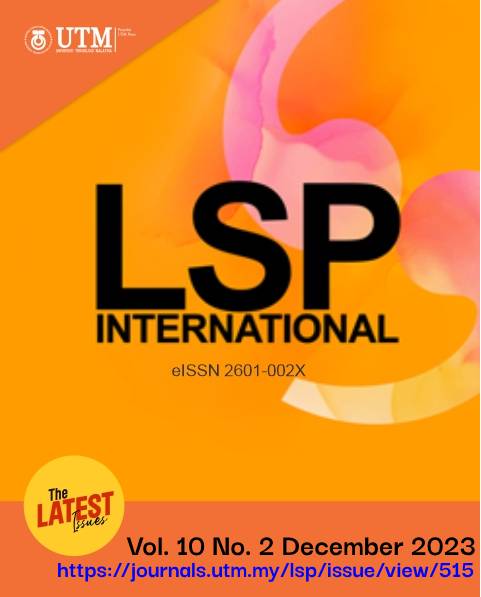International Students’ Vocabulary Mastery and Language Confidence in Foreign Language Learning through Student-Centered Method
DOI:
https://doi.org/10.11113/lspi.v10.18449Keywords:
Action Research, Two-Way Question-Answer Method, Foreign Language Learning, Vocabulary Mastery, Confidence in CommunicationAbstract
Among the major problems faced by international students learning Malay language are the limitation of Malay language vocabulary mastery and the lack of confidence in Malay-language question and answer process. This research explores the effectiveness of the Two-Way Question-Answer method as an alternative method in building student’s vocabulary and confidence in Malay question-answer. The research involved 30 international post-graduate students of Malay Language Course 1 at Universiti Kebangsaan Malaysia (UKM). The research was conducted by action research where the data obtained through observation during intervention methods, comparison between conventional and intervention methods’ post test score as well as the linkages between variables in the questionnaire form. The data were analyzed using the Wilcoxon Sign Rank test for score comparison and Simple Linear Regression tests for the analysis of the association between variables. Results of the research shows that the participants build their vocabulary and self-confidence through a question-and-answer exercises during the intervention session. Comparison analysis between conventional and intervention cycle for both skills recorded a significant difference, with p value of 0.000 recorded by both. Regression analysis showed a significant association between intervention method for both targeted skills, with R Square/ R₂ values for vocabulary (0.751) and verbal answer method (0.711). This finding proves that the use of the Two-Way Question-Answer method has the potential to help second and foreign language learners increase vocabulary and confidence in foreign language
References
Akkakoson, S. (2016). Speaking anxiety in English conversation classrooms among Thai students. Malaysian Journal of Learning and Instruction, 13, 63-82.
Annisa Awaludin. (2013). Techniques in presenting vocabulary to young EFL learners. Journal of English and Education, 1(1), 11-20.
Aulia Nisa Khusnia. (2016). Students’ perspectives on speaking anxiety in the English foreign language classroom. Ahmad Dahlan Journal of English Studies, 3(2), 41-51.
Asmah Haji Omar. (2015). Nahu Melayu Mutakhir – Edisi Ketiga. Kuala Lumpur: Dewan Bahasa dan Pustaka.
Awang Sariyan. (2011). Pengajian Melayu di China (Bahagian 1): Hubungan Ketamadunan Melayu-China. Retrieved from http:// klikweb.dbp.my/?p=1799. (29/11/2019).
Bai, Z. (2018). An analysis of English vocabulary learning strategies. Journal of Language Teaching and Research, 9(4), 853-859.
Cagatay, S. (2015). Examining EFL student’s foreign language speaking anxiety: The case at a Turkish state university. Procedia-Social and Behavioral Sciences, 199, 648-656.
Candry, S., Deconinck, J., & Eyckmans, J. (2018). Written repetition vs. oral repetition: Which is more conducive to L2 vocabulary learning? Journal of the European Second Language Association, 2(1), 72-82.
Erol, R.Y. & Orth, U. (2011). Self-esteem development from age 14 to 30 years: A longitudinal study. Journal of Personality and Social Psychology, 101(3), 607-619.
Ibrahim, A. (2015). Correlation between self-confidence and speaking skill of english language teaching and English language and literature preparatory students. Turkey: Cecen University.
Kang, O., and Moran, M. (2014). Functional loads of pronunciation features in nonnative speakers' oral assessment. Tesol Q, 48, 176-187.
Kemmis, S. & McTaggart, R. (1988). The action research planner. 3rd Edition. Geelong: Deakin University Press.
MOE. (2015). Malaysia Education Blueprint 2015-2025 (Higher Education). Ministry of Education Malaysia. Putrajaya: Ministry of Education Malaysia.
MOHE. (2021). 2021 Higher Education Statistics. Ministry of Education Malaysia. Putrajaya: Ministry of Education Malaysia.
Moody, S., Hu, X., Kuo, L. J., Jouhar, M., Xu, Z., & Lee, S. (2018). Vocabulary instruction: A critical analysis of theories, research, and practice. Education Science, 8(180), 1-22.
National Accreditation Board. (2005). Sukatan Pelajaran Bahasa Kebangsaan dan Mata Pelajaran Wajib Institusi Pengajian Tinggi Swasta. 2nd Edition. Kuala Lumpur: National Accreditation Board.
Nation, I. S. P. (2013). Learning vocabulary in another language. 2nd edition. Cambridge: Cambridge University Press.
Ahmed, N. F. (2016). An exploration of speaking anxiety with Kurdish University EFL Learners. Journal of Education and Practice, 7(27), 99-106.
Nik Safiah Karim et al. (2015). Tatabahasa Dewan. Edisi ke-3. Kuala Lumpur: Dewan Bahasa dan Pustaka.
Rao, P. S. (2019). The importance of speaking skills in English classroom. Alford Council of Interantional English & Literature Journal, 2(2), 6-17.
Stefaniak, J. & Tracey, M. (2015). An exploration of student experiences with learner-centered instructional strategies. Contemporary Educational Technology, 6(2), 95-112.
Teng, F. (2018). A learner-based approach of applying online reading to improve learner autonomy and lexical knowledge. Spanish Journal of Applied Linguistics, 31, 104-134.
Tiwari, T. D. (2021). Classroom Interaction in Communicative Language Teaching of Public Secondary Schools in Nepal. Indonesian Journal of English Language Teaching and Applied Linguistics, 5(2), 373-386.
Tunçel, H. (2015). The relationship between self-confidence and learning Turkish as a foreign language. Educational Research and Reviews, 10(18), 2575-2589.
Weimer, M. (2013). Learner – centered teaching: Five Key Changes to Practice. San Francisco: Jossey Bass.
Yousif, O. & Bashir, I. (2015). An investigation into the sources of english language speaking anxiety from the university students' perspective. SUST Journal of Humanities, 16(1), 127-143.
















